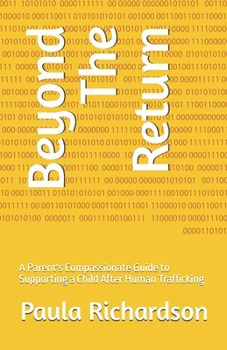Beyond The Return: A Parent's Compassionate Guide to Supporting a Child After Human Trafficking
The book confronts the painful reality that a child's first return home is often not their final one, emphasizing the deep psychological hold traffickers exert through trauma bonding. It advises parents to establish their home as an unconditional "safe haven" during these intermittent returns, acting as silent observers and "private investigators" by discreetly gathering crucial information (names, places, physical marks) without forcing conversations that could endanger the child upon their next return to the trafficker.
A central, difficult theme is the counsel to control the urge to physically prevent the child from leaving. This strategic "letting go" is presented as a counter-intuitive but necessary move that can both encourage the child to feel safe enough to return when things become unbearable, and make the trafficker believe the parent is "cooperative," buying valuable time and opportunity. During these difficult departures, parents are urged to think like "chess players, not checkers players" and to gather vital intelligence, such as license plate numbers.
While the child is away, the book guides parents through a "Big Investigation" period. This involves discreetly searching for any left-behind clues, thoroughly educating themselves on local and national resources for both victims and their caregivers, preparing a safe and informed family circle, and maintaining consistent contact through familiar channels. Crucially, it stresses the importance of parents seeking their own trauma support, recognizing that they cannot pour from an empty cup.
Upon the child's final return, the book starkly warns that "the child who left is NOT the child who has returned." It details the profound changes brought by trauma, brainwashing, learned deception, and potential new behaviors such as substance abuse, anger issues, or an ingrained "game" mentality focused on immediate gain. Parents are guided on understanding these new realities and the supreme importance of setting loving, firm boundaries while embracing who their child has become.
Finally, the book emphasizes "smart parenting," advising parents to protect their own physical space (e.g., securing valuables due to learned survival behaviors) and mental health. It encourages building a "safe circle" of trusted confidantes for the parent to process their own trauma and stresses that the healing journey for both parent and child will be long, requiring immense patience, professional support, and unwavering hope.
Ultimately, "Beyond the Return" is a powerful testament to parental love and resilience, offering practical, empathetic strategies to navigate the complex aftermath of human trafficking and guide a child back to a life of freedom and dignity.





